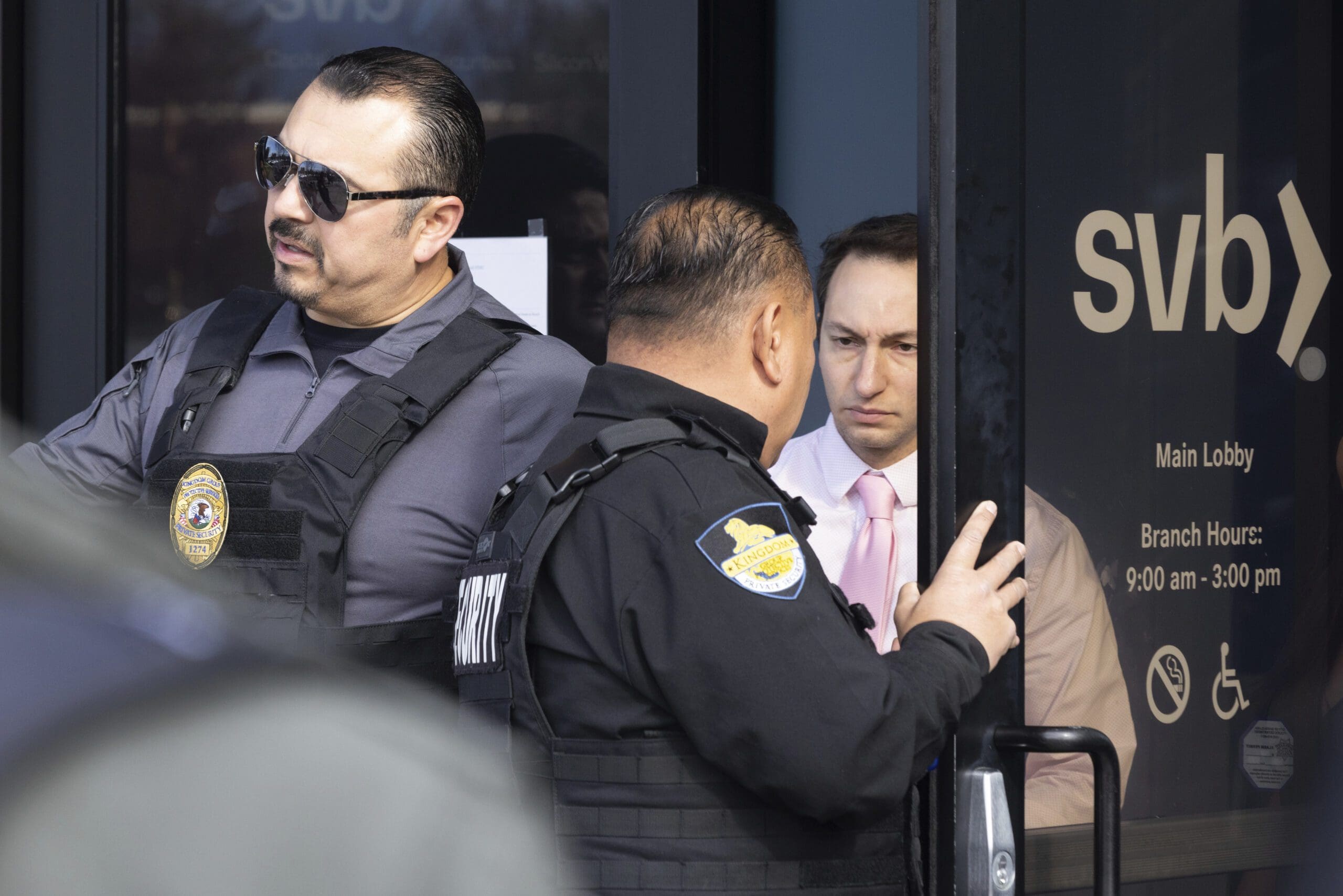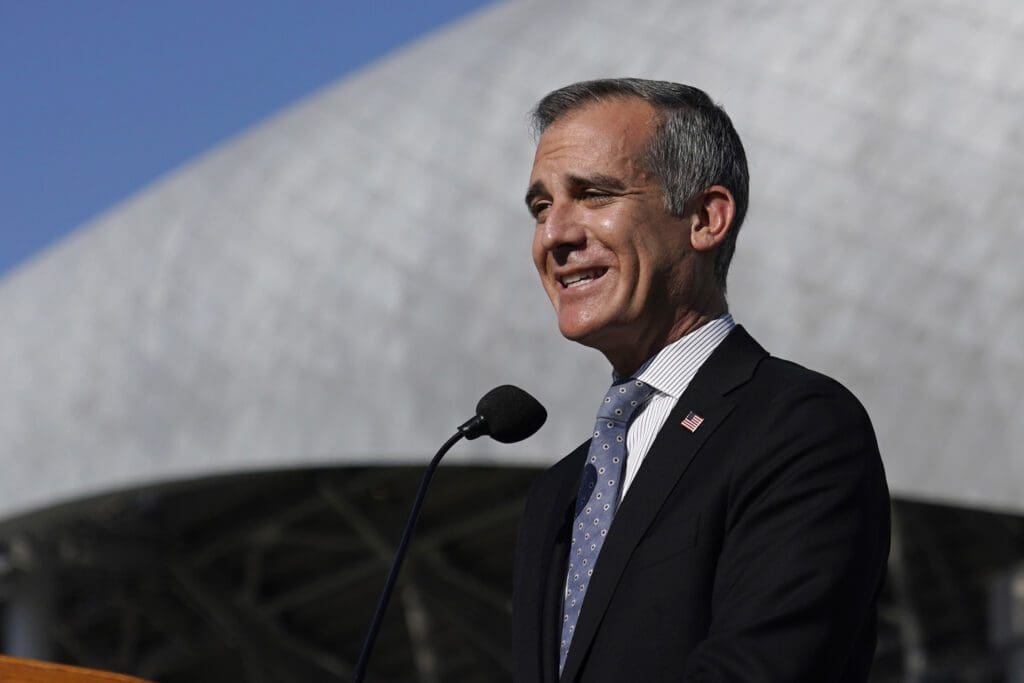

Crypto feared being walled off from traditional finance. The banking crisis is fueling those worries.
Igor Fayermark, from the Federal Deposit Insurance Corporation, exits Silicon Valley Bank’s headquarters in Santa Clara, Calif., on March 13, 2023. | Benjamin Fanjoy/AP Photo
America’s biggest banking blowup since the 2008 financial crisis is causing new headaches for crypto executives.
The three banks that suddenly collapsed in the last week served the digital asset industry, and their downfall has stoked concern that crypto will be walled off from traditional finance in the U.S.
Regulators including the Federal Reserve have been cautioning lenders for months about the risks of dealing in digital assets. To crypto critics, those warnings sound prescient in the wake of the seizure of Silvergate Capital, Silicon Valley Bank and Signature Bank by the government. To crypto executives, they sound like trouble.
“If banks are being told they can’t bank the sector, then how does the sector create diversification and banking?” said Dante Disparte, chief strategy officer at stablecoin issuer Circle. “The risk, unfortunately, was too few banks banking too big a sector.”
The banking turmoil of the last week is the latest setback for a crypto industry that saw much of its value wiped out after the collapse of one of the largest crypto exchanges, FTX, and the indictment of its founder, Sam Bankman-Fried.
In recent years, Silvergate and Signature, especially, had become integral parts of the digital asset ecosystem by offering both traditional banking services as well as speedy payments networks. SVB had less exposure to the industry.
Now, with the banks shuttering, executives have been sent into a mad dash, hunting for new banking partners — with some experts also speculating that regulators are trying to put them out of business.
“It’s hard to look at this and not see a coordinated effort to choke off the industry,” said Ryan Selkis, CEO of crypto research firm Messari.
Yet not everyone is convinced that the banking crisis is heavily linked to the lenders’ ties to crypto. Ultimately, the cause was probably a combination of poor risk management and macroeconomic issues, said Mark Williams, a former Federal Reserve bank examiner who teaches at Boston University. Notably, the Fed’s aggressive fight against inflation left some lenders strapped with waning deposits and deeply discounted bonds that they could only sell at a loss.
“When you lose depositor confidence,” Williams said, “not even the strongest bank can stand up.”
A spokesperson for the New York Department of Financial Services, which shut down Signature on Sunday, said the decision “had nothing to do with crypto,” adding that the bank dealt in everything from food vendors to commercial real estate as well.
“The bank failed to provide reliable and consistent data, creating a significant crisis of confidence in the bank’s leadership,” the spokesperson, who was granted anonymity to speak about a department decision, said in a statement. “The decision to take possession of the bank and hand it over to the FDIC was based on the current status of the bank and its ability to do business in a safe and sound manner on Monday.”
The New York regulator’s remark came after former Rep. Barney Frank, a Signature board member, told POLITICO on Monday that the bank run was caused by “the nervousness and beyond nervousness from [Silicon Valley Bank] and crypto.”
“I think if it hadn’t been for FTX and the extreme nervousness about crypto, that this wouldn’t have happened — even to [Silicon Valley Bank] or to us,” said the Massachusetts Democrat who was a key architect of new rules enacted in the aftermath of the 2008 crisis. “And that wasn’t something that could have been anticipated by regulators.”
Regulators, nonetheless, are watching for any fallout from the banking industry’s woes to crypto.
Commodity Futures Trading Commission Chairman Rostin Behnam said Wednesday that he is “comfortable that we’re going get through this without disruptions to our markets” following the banking regulators’ response over the weekend.
But the CFTC is watching to make sure that the crypto-linked derivatives markets it oversees “remain resilient [and] free from fraud.” Given the close ties that Silvergate and Signature had to the industry, Behnam told reporters at an industry conference in Florida that there is a chance that the crypto market could see issues on liquidity and access to traditional finance.
So far, the immediate impact has been relatively muted among some of crypto’s biggest players.
Coinbase, the country’s top crypto exchange by market volume, has $240 million of corporate funds stuck at Signature, according to the company. But no customer funds have been affected, Coinbase said in a tweet.
Kraken is winding down its relationship with Silvergate. Both companies have said they use a number of different banks for customer funds.
Circle’s dollar-pegged token USDC, however, was rocked by traders over the weekend.
The so-called de-pegging came after the company disclosed it had more than $3 billion deposited with Silicon Valley Bank. While that only represented a fraction of the Circle’s reserves — the bulk of which are held in a BlackRock-managed money market fund — news of its exposure sent the price of the token plummeting below its $1 peg. The token has since rebounded to the relief of crypto executives and backers.
USDC’s “breaking the buck” injected uncertainty into crypto markets that view the token as a stable asset and critical element of the ecosystem’s payment infrastructure.
The volatility had more to do with Silicon Valley Bank than Circle, Disparte said. The bank’s investment portfolio was torpedoed when the Fed started raising rates to bring down inflation. Circle’s exposure to the institution presented a major threat to its token.
Disparte said he’s hopeful that pro-crypto lawmakers can leverage the calamity around the collapse of the three banks to pass stablecoin legislation, which has been in the works at House Financial Services for nearly a year.
Sam Sutton, Zachary Warmbrodt and Victoria Guida contributed to this report.









